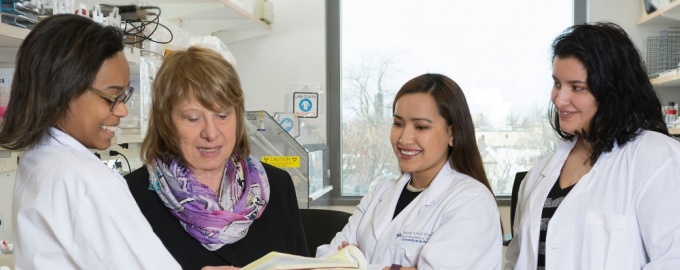IMSD Program Overview

Margarita L Dubocovich, PhD reviews research data with postdoctoral Scholars Carleara Weise, PhD and Shanta Karki, PhD, and graduate student Jennifer Sosa.
The IMSD@UB promotes student's success by providing unique resources to help develop skills and talent, reach academic and research goals, and earn a PhD in biomedical, behavioral or STEM sciences.
Students admitted to a participating PhD program are eligible to apply for admission into the IMSD@UB Program.
Mentoring
Good mentoring is an integral component of a scientist's training. In addition to the traditional reseach faculty mentor, the IMSD@UB connects students with many mentors that will make a positive impact on their development. These mentors help students navigate life as a graduate student and provide advice to promote the students' academic, professional, and personal growth.
Financial Support
Students in the IMSD@UB receive funding that covers tuition and receive a $35,000 yearly salary for the first two years in their PhD program. Funds are also available to help students attend national conferences and present their research.
Knowledge-Base
The IMSD leadership has created a knowledge base identifying professional development and doctoral training activities each scholar should complete to aid in successful completion of their PhD program and career development. The knowledge base will be introduced to IMSD scholars ahead of the fall semester of the first year of graduate training, and emphasized throughout their training at student advisory group (SAG) meetings and during professional development workshops.
Activities provided in the knowledge base are divided into categories including professional development workshops and seminars, research and ethics training, writing training, conference and meeting attendance, and mentor support.
The IMSD leadership meet with IMSD scholar and IMSD mentor pairs yearly to ensure the IMSD scholar is meeting PhD program and career development milestones as outlined in the knowledge base.
Laboratory Training Course
Before the first semester begins, students complete an intensive two-week program designed to give incoming graduate students basic laboratory skills, animal and/or human subjects ethics training, laboratory safety procedures and/or other skills necessary to be successful in research rotations and beyond. This Labratory Training Course will be rescheduled for the 2025 Cohort of IMSD PhD Scholars.
Summer Research Rotation
Students begin the IMSD program in the summer before their first semester of course and spend several weeks conducting research in the team of a funded IMSD Research Mentor, which may continue into the Fall semester. The Summer Research Rotation will not be offered to the 2025 Cohort of IMSD PhD Scholars.
Professional Development Workshops
Students in the IMSD@UB participate in professional development workshops that promote skills needed for success in graduate school. Initial workshops are designed to help students have a successful start to graduate school (e.g., becoming a resilient graduate student, choosing mentors, excelling in research rotations, interacting and working with others, ethics training, among others). Later workshops focus on developing oral and written communications skills, with the eventual goal of securing funding by applying to external fellowship, and grant awards from the National Institute of Health, National Sciences Foundation, and/or Foundation Agencies.
The workshops, organized as micro-credentials with the award of e-badges, include:
- Professional Development Catalyst Series (Orienting to Graduate School)
- Research Communication Workshops (Effective Scientific Communication)
- Scientific Communication for Success I (Research Development and Grant Writing)
- Scientific Communication for Success II (Training Plans and Grant Submission)
Students are also required to complete two other workshop series:
- Proficiency in Data Analysis and Presentation Series (e.g., Blender, Photoshop, GraphPad, others)
- and Professional Development in Technical Skills (e.g., Introduction to Coding; AI as a Co-Pilot with attention to Ethics).
Academic Support
Each student in the IMSD@UB has a Student Advisory Group (SAG) that ensures the student meets all graduate program requirements and has the support to succeed. The SAG can develop an individualized curriculum when necessary to include courses to increase scientific strength, and provide advice regarding research rotations and core courses.
The IMSD@UB facilitates formation of study groups for major courses to strengthen learning and enhancing academic success.
Career Planning - Individual Development Plan
Students create individual development plans with help from the IMSD leadership and faculty advisers to map their career goals and maximize their talent. IMSD mentors, faculty advisers and guest speakers will provide advice and insights into potential careers in science.

